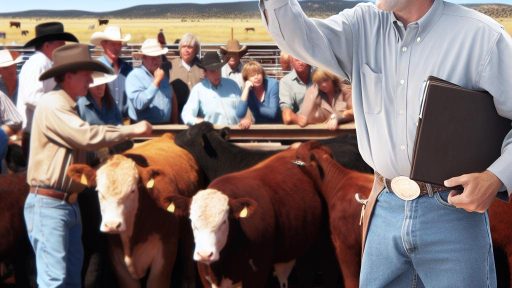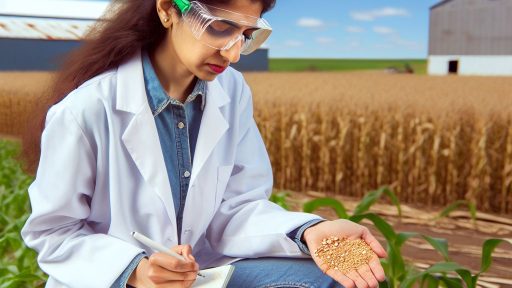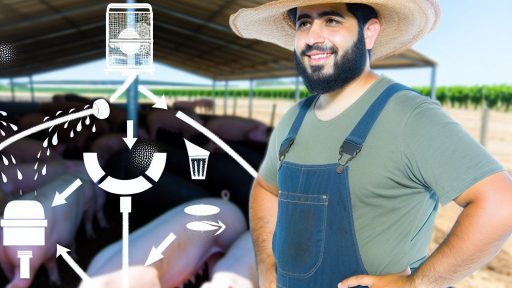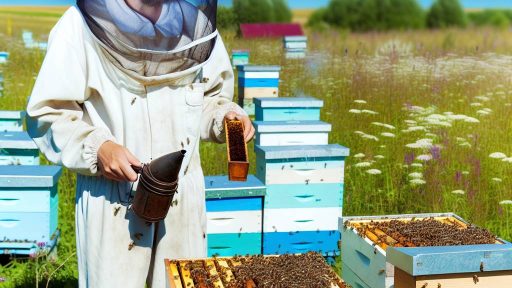Introduction to Organic Livestock Farming and Its Importance for Animal Welfare
Organic livestock farming prioritizes the well-being of animals above all else.
This farming style creates a healthy environment for livestock.
Animals raised organically enjoy better physical and mental health.
Moreover, organic practices encourage natural behaviors in livestock.
This approach contrasts sharply with conventional farming methods.
Conventional methods often prioritize profit over animal welfare.
Consequently, animals may suffer from crowded conditions and stress.
In organic livestock farming, animals have access to outdoor spaces.
They graze on natural pastures, promoting their physical activity.
This freedom contributes to healthier animals overall.
Furthermore, organic standards prohibit the use of growth hormones.
This regulation leads to more ethical treatment of livestock.
Organic livestock farmers also use sustainable feed sources.
Such feeds are free from synthetic pesticides and fertilizers.
As a result, animals consume healthier diets that benefit their health.
Transform Your Agribusiness
Unlock your farm's potential with expert advice tailored to your needs. Get actionable steps that drive real results.
Get StartedAdditionally, organic farming supports biodiversity on farms.
This practice provides a rich habitat for various species.
Consequently, the environment flourishes alongside livestock.
Animal welfare is not just a trend; it is now a public demand.
Consumers increasingly seek products from humane farming systems.
As such, investing in organic practices meets market needs.
In summary, organic livestock farming embodies a commitment to animal welfare.
It holds the potential to reform the farming landscape for the better.
Key Principles of Organic Livestock Farming
Definition and Standards
Organic livestock farming focuses on raising animals without synthetic chemicals.
This approach emphasizes animal welfare and sustainable practices.
Farmers must follow specific regulations and standards to be certified organic.
These standards vary by country but generally prioritize the animal’s natural behaviors.
For instance, provide adequate space and access to pasture for grazing.
Moreover, organic feed must consist of certified organic ingredients.
Farmers cannot use antibiotics or growth hormones in organic production.
Instead, they focus on preventive care and holistic management strategies.
This method considers the entire ecosystem, including soil health and biodiversity.
Furthermore, sustainable practices foster a balance between agriculture and nature.
Organic livestock farms contribute positively to community health and welfare.
They often support local economies by sourcing feed and supplies from nearby producers.
Ultimately, organic livestock farming aims to produce food that is healthy and humane.
Consumers benefit from knowing their food comes from responsible sources.
Thus, the principles of organic livestock farming extend far beyond the farm itself.
Benefits of Organic Practices for Animal Health and Welfare
Enhanced Living Conditions
Organic livestock farming prioritizes natural living conditions for animals.
Showcase Your Farming Business
Publish your professional farming services profile on our blog for a one-time fee of $200 and reach a dedicated audience of farmers and agribusiness owners.
Publish Your ProfileThese systems provide adequate space for movement and socialization.
The absence of confinement reduces stress and promotes overall well-being.
Animals thrive in environments that mimic their natural habitats.
Nutritional Advantages
Organic feeding practices support better animal nutrition.
Livestock consume organic feeds free from synthetic additives.
This leads to healthier animals that produce higher-quality products.
Additionally, organic diets enhance the animals’ resistance to disease.
Reduced Use of Antibiotics
Organic farming significantly limits antibiotic usage.
This approach allows animals to develop natural immunity.
Consequently, it combats the issue of antibiotic resistance in humans.
Maintaining animal health naturally reduces reliance on medications.
Sustainable Farming Practices
Organic livestock farming embraces sustainable practices.
These methods respect animal welfare and environmental health.
This holistic approach preserves resources for future generations.
Farmers employ crop rotation and diversified farming systems.
Positive Animal Behavior
Organic farming encourages natural animal behavior.
Animals engage in instinctive activities, such as grazing and exploring.
Such behaviors are crucial for their psychological well-being.
Healthy social interactions among animals reduce aggression and stress.
Certification and Consumer Trust
Organic livestock farming requires strict certifications.
These standards enforce humane and ethical treatment of animals.
Consumers increasingly prefer products from certified organic farms.
This growing demand incentivizes farmers to uphold high welfare standards.
Delve into the Subject: Setting Up Your First Aquaculture System: A Beginner’s Guide
Comparative Analysis: Organic vs Conventional Livestock Farming
Animal Housing and Space Requirements
Organic livestock farming prioritizes animal welfare through spacious housing.
Animals raised organically have access to outdoor spaces.
This allows them to engage in natural behaviors.
In contrast, conventional farming often relies on confined spaces.
Many conventional farms limit the animals’ movement significantly.
Feeding Practices
In organic farming, animals receive organic feed free from synthetic additives.
This results in healthier animals and produces higher-quality products.
Conversely, conventional farms may use non-organic feed and growth hormones.
This can impact the overall health and well-being of the livestock.
Health and Disease Management
Organic farmers rely on preventive health measures to maintain animal health.
This includes vaccinations, natural remedies, and holistic practices.
Conventional farmers often administer antibiotics and hormones to boost growth.
Overuse of these substances can lead to antibiotic resistance.
Environmental Impact
Organic livestock farming emphasizes sustainability and environmental protection.
This method significantly reduces pollution from fertilizers and chemicals.
On the other hand, conventional livestock farming can contribute to soil and water degradation.
Showcase Your Farming Business
Publish your professional farming services profile on our blog for a one-time fee of $200 and reach a dedicated audience of farmers and agribusiness owners.
Publish Your ProfileIt often relies on intensive practices that strain natural resources.
Consumer Perception and Market Trends
Consumers increasingly favor organic products for perceived quality and safety.
This trend drives higher demand for organic livestock products.
Meanwhile, conventional products face scrutiny due to health and environmental concerns.
As a result, many consumers are willing to pay a premium for organic options.
You Might Also Like: Beef Cattle Feeding Plans for Maximum Growth
Best Practices in Organic Livestock Management for Enhanced Animal Welfare
Providing Adequate Space
Ensure animals have ample space to move freely.
Space reduces stress and prevents aggressive behavior among livestock.
Consider both indoor and outdoor environments when evaluating space requirements.
Nutrition and Feeding Standards
Offer a balanced diet suitable for each species.
High-quality feed enhances health and overall vitality.
Organic livestock farming emphasizes natural feeding practices.
Monitor feeding schedules to prevent malnutrition.
Social Interactions and Group Dynamics
Allow animals to socialize within their groups.
Social interaction promotes mental well-being for livestock.
Avoid mixing unfamiliar animals to lessen stress.
Veterinary Care and Disease Prevention
Implement a proactive veterinary care program.
Regular check-ups help catch health issues early.
Vaccination schedules must align with best practices.
Utilize organic remedies to treat common ailments.
Environmental Enrichment
Enhance living conditions with environmental enrichment.
Provide toys, bedding, and structures for exploration.
Engaging environments foster mental stimulation.
Maintaining Cleanliness and Hygiene
Regularly clean living spaces to minimize disease transmission.
Ensure proper waste management practices are in place.
Clean environments contribute to the overall health of livestock.
Humane Handling Practices
Train staff in humane handling techniques.
Gentle handling reduces fear and stress in animals.
Use low-stress handling methods during feeding and care.
Regular Monitoring and Assessment
Conduct daily assessments of livestock behavior and health.
Identify any signs of distress or illness promptly.
Analyzing animal welfare indicators fosters continuous improvement.
Compliance with Organic Standards
Adhere to established organic farming standards.
This compliance ensures ethical treatment and practices.
Keep thorough records of all farming activities.
Gain More Insights: Pest Control Strategies For Livestock Housing
The Role of Natural Feeding Practices in Promoting Animal Well-Being
Understanding Natural Feeding Practices
Natural feeding practices focus on providing animals with their natural diet.
This diet includes forage, grains, and natural supplements.
Farmers often grow organic feed to ensure quality and nutrition.
By mimicking natural diets, animals exhibit improved health and vitality.
Showcase Your Farming Business
Publish your professional farming services profile on our blog for a one-time fee of $200 and reach a dedicated audience of farmers and agribusiness owners.
Publish Your ProfileBenefits for Animal Welfare
Natural feeding promotes better digestion in livestock.
Improved digestion enhances nutrient absorption.
This leads to healthier, more resilient animals.
Moreover, it reduces the likelihood of gastrointestinal diseases.
Fostering Behavioral Well-Being
Natural feeding practices can influence animal behavior positively.
When animals receive a varied diet, they exhibit fewer stress behaviors.
For instance, access to forage encourages natural foraging habits.
This promotes mental stimulation and physical activity.
Improving Reproduction and Growth Rates
Nutrition directly impacts reproductive success in livestock.
Better diets result in higher fertility and improved gestation outcomes.
Additionally, natural feeding enhances growth rates in young animals.
This ensures healthier livestock for farmers and more productivity.
Enhancing Meat and Milk Quality
Natural diets contribute to superior taste and nutritional quality in products.
Grass-fed beef, for example, is known for its rich flavor.
Likewise, milk from pasture-raised cows has higher healthy fat content.
Consumers increasingly prefer such high-quality animal products.
Implementing Sustainable Practices
Using natural feeding aligns with sustainable farming principles.
This approach reduces reliance on synthetic feeds and additives.
It also promotes soil health through organic farming practices.
Thus, farmers can ensure long-term sustainability on their operations.
See Related Content: Health Management in Exotic Farming

Challenges Faced by Organic Livestock Farmers and Strategies to Overcome Them
Regulatory Compliance
Organic livestock farmers often face strict regulations.
These regulations may vary by region and product type.
Compliance can be time-consuming and complex.
Farmers should stay informed about changing regulations.
Joining local organic farming associations can provide valuable resources.
Networking with other farmers can also help share knowledge.
Environmental Challenges
Weather fluctuations can impact organic farming significantly.
Organic farmers depend heavily on natural conditions.
Adopting sustainable practices can mitigate these challenges.
For example, crop rotation improves soil health.
Additionally, utilizing cover crops can prevent soil erosion.
Farmers should also invest in water conservation techniques.
Market Access and Competition
Organic products often compete with conventional offerings.
Price competition can make it difficult for organic farmers.
Farmers can improve their market position through direct sales.
Setting up a farm stand or community-supported agriculture (CSA) program could help.
Moreover, leveraging online sales channels expands reach.
Building strong relationships with local retailers can benefit farmers.
Animal Welfare Concerns
Maintaining high animal welfare standards is crucial for organic farmers.
Showcase Your Farming Business
Publish your professional farming services profile on our blog for a one-time fee of $200 and reach a dedicated audience of farmers and agribusiness owners.
Publish Your ProfileHowever, challenges such as disease management persist.
Farmers should prioritize preventive health measures.
Regular veterinary check-ups are essential for overall health.
Utilizing holistic approaches can also support animal wellbeing.
These approaches may include better nutrition and stress reduction techniques.
Resource Management
Organic livestock farming often requires additional labor and resources.
Farmers may struggle with the correct allocation of these resources.
Time management and planning become critical skills.
Farmers can benefit from creating detailed management plans.
Utilizing technology can enhance efficiency and productivity.
Farmers should also evaluate their resource needs regularly.
Case Studies: Successful Organic Livestock Farms and Their Welfare Approaches
The Green Pastures Farm
The Green Pastures Farm is located in Wisconsin.
This farm focuses on holistic grazing practices.
They prioritize the well-being of their cattle.
The farm uses pasture rotation to enhance soil health.
Moreover, the cattle enjoy ample space to roam freely.
This method significantly reduces stress among animals.
Additionally, the farm maintains a low-density grazing system.
Thus, the cows can engage in natural behaviors.
Overall, animal health has improved remarkably here.
Sunny Hill Acres
Sunny Hill Acres is a model for poultry welfare.
Located in Georgia, this farm utilizes mobile coops.
The coops allow hens to forage naturally.
This practice results in healthier birds and eggs.
Also, the farm avoids the use of antibiotics entirely.
Instead, they focus on proper nutrition and habitat.
This leads to robust immune systems in their flocks.
As a result, Sunny Hill Acres has gained a loyal customer base.
Maple Grove Organics
Maple Grove Organics is renowned for its sheep farming.
This farm practices rotational grazing on diverse pastures.
The diversity helps improve soil fertility and plant health.
Additionally, they incorporate herbal pastures into their system.
This enhances both nutrition and animal welfare.
Furthermore, the sheep have constant access to clean water.
Farmers use low-stress handling techniques during shearing.
Consequently, the sheep experience minimal stress and discomfort.
Happy Hooves Ranch
Happy Hooves Ranch specializes in sustainable pig farming.
This ranch in Oregon emphasizes natural habitats.
Pigs enjoy outdoor spaces where they can root and explore.
The space allows for social interactions and play.
Showcase Your Farming Business
Publish your professional farming services profile on our blog for a one-time fee of $200 and reach a dedicated audience of farmers and agribusiness owners.
Publish Your ProfileMoreover, the pigs receive a diet free from synthetic additives.
This fosters better health and higher quality meat.
Farmers also practice ethical breeding techniques.
Ultimately, consumer trust in Happy Hooves Ranch remains strong.
Lessons Learned from These Farms
These case studies underline the importance of animal welfare.
Additionally, they highlight the benefits of organic practices.
Holistic management improves both animal and environmental health.
Moreover, consumer demand for ethically raised livestock continues to rise.
Successful organic farms prove sustainable methods yield positive outcomes.
Future Trends in Organic Livestock Farming and Continuous Improvement of Animal Welfare
Emphasis on Holistic Management
Organic livestock farming is increasingly adopting holistic management practices.
This approach integrates animal health, ecological balance, and farm profitability.
Farmers now focus on the entire ecosystem, rather than individual aspects.
By understanding the interconnectedness of all elements, they improve animal welfare.
Adoption of Technology
New technologies are revolutionizing organic livestock farming.
Farmers utilize precision agriculture tools to better monitor animal health.
Wearable technology helps in tracking livestock behavior and well-being.
This data enables rapid response to any sign of distress in animals.
Increased Focus on Biodiversity
Biodiversity is becoming a key principle in organic livestock management.
Diverse breeds are being preserved to improve resilience against diseases.
Farmers are recognizing the importance of promoting genetic diversity.
Additionally, incorporating various animal species can enhance ecosystem services.
Strengthening Animal Welfare Standards
Regulatory bodies are tightening animal welfare standards in organic farming.
Higher welfare standards lead to improved living conditions for livestock.
As a result, consumer demand for ethically raised animal products is rising.
This trend necessitates ongoing training for farmers on welfare best practices.
Continued Consumer Education
Educating consumers about the benefits of organic farming is crucial.
This education fosters a deeper understanding of the practices involved.
As consumers become more informed, they can make better choices.
Additionally, awareness campaigns can promote the value of animal welfare.
Collaborations for Improvement
Collaborative efforts between farmers, researchers, and organizations are vital.
These partnerships foster innovation in animal care techniques.
Shared knowledge leads to continuous improvement in farming practices.
Combining experiences from different stakeholders enhances overall welfare outcomes.
Additional Resources
Digital Livestock Technologies as boundary objects: Investigating …




